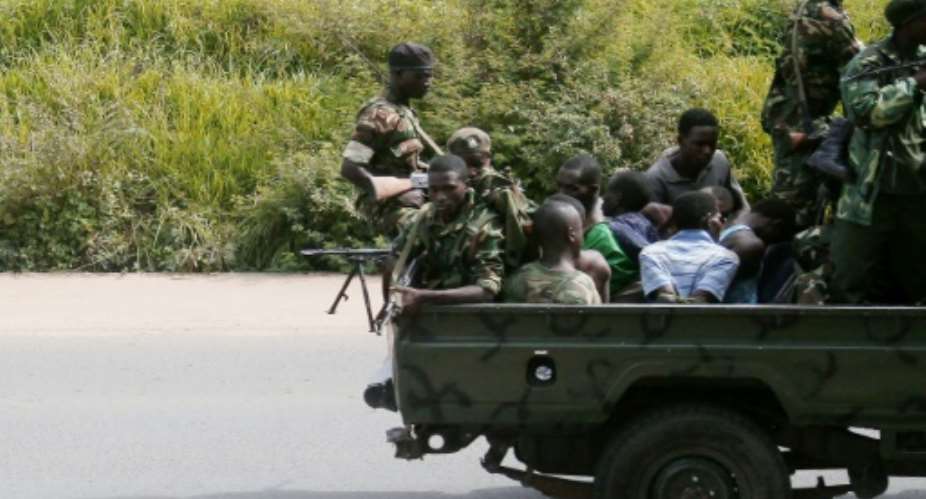Bujumbura (Burundi) (AFP) - UN Security Council ambassadors arrived in Burundi Thursday to protestors telling them not to interfere, as they came to push the government to open up serious talks with the opposition and accept peacekeepers.
A crowd of hundreds of protesters backing the government, carrying signs in English that said "genocide will not happen" and "stop interfering in Burundian affairs", greeted the diplomats as they landed in the capital Bujumbura, an AFP reporter with the council said.
At a meeting planned for Friday, the council hopes to persuade President Pierre Nkurunziza to agree to an African Union proposal of 5,000 peacekeepers, which his government has branded an "invasion force".
Before UN diplomats arrived, the AU expressed its "fervent hope" the diplomats will persuade Burundi to begin serious talks and agree to the deployment of peacekeepers to prevent further violence.
AU Commission chief Nkosazana Dlamini-Zuma said in a statement that there was an "urgent and imperative need for a strong unity of purpose" to solve the crisis.
Discussion of the peacekeeper deployment is expected to be a key element of talks at the AU summit in Ethiopia on January 30-31.
An AU deadline for Burundi to accept the force has long passed with no action yet taken to deploy the peacekeepers, named the African Prevention and Protection Mission in Burundi (MAPROBU).
Dlamini-Zuma expressed "the fervent hope" that the UN ambassadors will "contribute toward achieving" the rapid deployment of MAPROBU and the "immediate resumption of the inter-Burundian dialogue", in reference to stalled talks between the government and opposition.
But the protestors who had been waiting for the diplomats made clear their opposition.
"Rwanda, stop Burundian refugees military recruitment," another protestor's sign read.
Relations between Rwanda and neighbouring Burundi are tense, with Bujumbura accusing Kigali of backing armed rebels and political opponents of Nkurunziza. Rwanda has denied all the claims.
Burundi descended into bloodshed in April when Nkurunziza announced his intention to run for a controversial third term, which he went on to win in July elections.
More than 400 people have died in the violence and at least 230,000 have fled to neighbouring countries.
Hours before the UN diplomats arrived, Burundian rebels named a fugitive ex-general who fled after leading a failed coup bid last May as their leader.
Ex-general Godefroid Niyombare, a former intelligence chief, is the leader of the Forebu rebels, said spokesman Edward Nibigira, himself a former senior police general.
The rebel force, which announced its formation in December after months of unrest and bloodshed in the troubled central African country, calls itself the Republican Forces of Burundi, or "Forebu" after its French acronym.
The rebels formed the force "to protect the population" and uphold the Arusha Agreement that paved the way to the end of the 1993-2006 civil war but which they say Nkurunziza violated by running for, and winning, a third term in power.





 Akufo-Addo spotted ordering chiefs to stand for his handshake
Akufo-Addo spotted ordering chiefs to stand for his handshake
 Akufo-Addo ‘disrespects’ every chief in Ghana except Okyenhene — NDC Communicato...
Akufo-Addo ‘disrespects’ every chief in Ghana except Okyenhene — NDC Communicato...
 Supreme Court clears way for dual citizens to hold key public positions
Supreme Court clears way for dual citizens to hold key public positions
 Be transparent, don’t suppress the truth – Prof. Opoku-Agyemang to Jean Mensa
Be transparent, don’t suppress the truth – Prof. Opoku-Agyemang to Jean Mensa
 ‘I won’t tell the world I was only a driver’s mate during challenges’ – Prof Jan...
‘I won’t tell the world I was only a driver’s mate during challenges’ – Prof Jan...
 We’ll prosecute corrupt officials of Akufo-Addo’s govt – Prof Jane Naana
We’ll prosecute corrupt officials of Akufo-Addo’s govt – Prof Jane Naana
 [Full text] Acceptance speech by Prof Jane Naana Opoku-Agyemang as 2024 NDC Runn...
[Full text] Acceptance speech by Prof Jane Naana Opoku-Agyemang as 2024 NDC Runn...
 Election 2024: Don’t be complacent, we haven’t won yet – Asiedu Nketia cautions ...
Election 2024: Don’t be complacent, we haven’t won yet – Asiedu Nketia cautions ...
 Election 2024: Stop fighting over positions in Mahama’s next govt – Asiedu Nketi...
Election 2024: Stop fighting over positions in Mahama’s next govt – Asiedu Nketi...
 Prof Jane Naana Opoku-Agyemang will restore dignity of vice presidency – Fifi Kw...
Prof Jane Naana Opoku-Agyemang will restore dignity of vice presidency – Fifi Kw...
